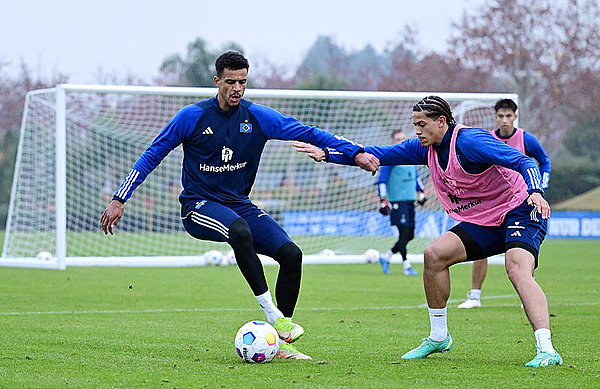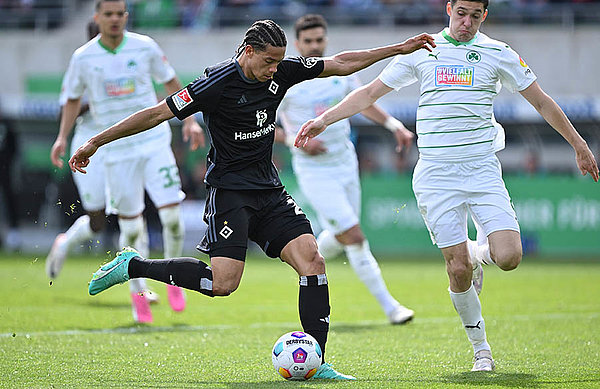
Interview
09.04.24
Andras Nemeth: "It's a case of give and take"
In an interview with HSV.de, Andras Nemeth spoke about making his first start at the Volksparkstadion, being a team player and how he deals with missed chances and injury set-backs.
HSV.de: Andras, you won 2-1 against 1. FC Kaiserslautern on Saturday evening. What can you tell us about the game?
Andras Nemeth: It wasn't easy. Our opponents defended deep and continued to pose a threat on the break. But, we managed to keep creating chances in the first half and to play with intensity and pace. It was followed by a hard-fought second half, in which we did well as a team. We stuck together and worked hard to earn all three points. It was extremely important for us to do so, because we all know what our goal is.
The game also marked a first for you, as it was your first start at home in a sold-out Volksparkstadion. What did that moment feel like for you?
It was a very special feeling; I was full of adrenaline. The fans always create an amazing atmosphere at home. It was a lot of fun to get to play in front of a crowd like that. It felt even better to then be able to celebrate a win together with our fans.
Prior to the game against Fürth, you had been subbed on a league-high 21 times this season. Due to Robert Glatzel's injury, you've now had the chance start back-to-back games. Has that had any impact on your mindset?
Knowing that you'll be starting a match automatically gives you a different mindset going into the game. Your adrenaline starts going and your preparations ahead of the game chance too, as you're involved in taking shots during the warm-up. That's probably the biggest difference compared to when you're just on the bench. When you're subbed on, everyone that's been on the pitch until then is already accustomed to the game, while you still need a minute to adjust to the intensity and the pace. That really makes a difference.

You're competing for a spot in the starting line-up with Robert Glatzel, a striker with a reputation for scoring goals. On the one hand, you have the chance to learn a lot from him, but on the other, it means that you don't see as much game time. How do you deal with this situation?
I'm able to learn a lot from Bobby, especially how he moves and positions himself inside the box. Everyone knows how good he is and how important he is to our team, and we talk a lot to each other. For example, he came up to me ahead of the Fürth game in order to prepare me a bit about what I should expect. That really helped me. At the same time, I obviously want to make the most of every start I'm able to earn. After all, every professional footballer wants to play as much as possible.
As a striker, your aim is also to score as many goals as possible. You've been waiting a long time now for another goal for HSV. How do you deal with a situation like that?
The most important thing to me is that I'm able to help the team and play well when I'm on the pitch. Individual statistics like goals or assists come after that. I've obviously been waiting a long time for another goal and my aim is to score again. Being on a wait for a goal doesn't put any extra pressure on me, because I've learned that I'm still able to put good performance even if I don't score. I work hard to help my teammates and they do the same for me. It's a case of give and take.
When you have moments like in Berlin or Fürth, where you aren't able to convert a clear-cut chance, how do go about analysing them afterwards?
First and foremost, it really bugs me when I'm unable to make the most of a chance like that. No one needs to mention it to me after the game. Obviously, we do then do through and analyse those moments the next day, which is when I'll talk to the coaches about what I did well and what I could have done better. After that, all you can do is train – it's the only way in order to improve and you're always working on taking different shots.

What works for you personally when it comes to finding motivation?
I really like watching back videos of my goals. I also replay highlights from my time in the academy before a game to give me some motivation. I find this really helpful, as well as having conversations with friends, my family and supporters. I talk to them about football almost every day. At the same time, it can also be beneficial to shut off from football for the day, like I did yesterday, as it helps to keep a clear head and recharge the batteries for the upcoming training session or match.
It was almost a year ago to the day that you suffered a broken ankle, the first major injury of your career, that caused you to miss a critical point in the season as a result. How was that experience for you?
That was a very difficult time for me. I was playing well and had a good overall energy to my game. Then came the injury, which meant I missed all the important matches at the end of the season, including the derby against St. Pauli. I was forced to watch from the sidelines, and, to be honest, that’s not where I want to be. I can really empathise with the emotions felt by the fans who have to watch from the stands every week.
For that reason, it’s even better that you’ll be in action for the end of this season.
Yes, thank god for that. I’m back to full fitness and haven’t noticed any ill effects from the injury. The surgery, rehabilitation process, and reintegration into the team all went well for me. I’m happy to be part of things this time round. I learnt a lot during my first year at HSV, particularly through the injury. I discovered the importance of remaining positive. There will always be difficult times, but when you work hard, you get rewarded with the good times. I’ll be taking that with me into the closing stages of the season.



